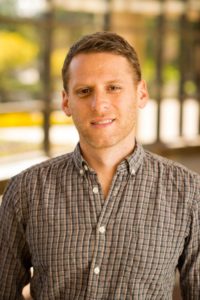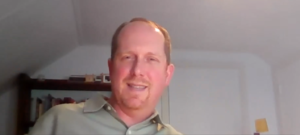By Jan Worth-Nelson
University of Michigan – Flint assistant professor Kimberly Saks adamantly declares she is not “unAmerican.”
At a virtual community town hall last week sponsored by a loosely-organized group of faculty, staff, students and alumni who call themselves the “people’s UM-Flint” to distinguish themselves from the official Strategic Transformation process underway at the downtown campus, Saks took issue with comments from Chancellor Deba Dutta in an EVM interview comparing critics of the process to election deniers in the current political realm.
“I want to make one comment on a personal level,” Saks declared at the end of the one-hour Zoom discussion, which drew about 40 in a combination of tenured faculty, lecturers, staff, students, and alumni — about half also identifying themselves as Flint residents.
“One thing I think many of us took to heart, but not in a good way…was the comment about us not wanting to see the university succeed, and the idea that if we don’t get our way we’re are going to blow up the process — and likening us to election deniers and being un-American.”
Saks, a political science faculty member, has been at UM – Flint for nine years and since 2017, director of the Masters of Public Administration program. The “peoples” group is responding to the Strategic Transformation effort, launched by Dutta in September following a charge from UM – Ann Arbor and UM’s governing body, the Regents. A range of severe problems urgently underly the process: a 30 percent enrollment drop — to fewer than 6,000 in 2020; a 35 percent graduation rate; and a $7.3 million budgetary deficit in 2021 — all understood to threaten the Flint regional UM campus.
Editor’s note: Enrollment at UM – Flint was 5,985 in 2022, just under 6,000, not under 5,000 as originally reported. Correct enrollment numbers, provided by UM – Flint on Jan. 2, 2023, are as follows:
Dutta has labeled the critics “detractors” and accused them of behaving territorially and individually in their criticisms, rather than institutionally.
That implication struck hard at the heart of what many at UM – Flint see as a vital role and responsibility within academic values as the process moves ahead; it also exacerbates a sense that the process is in reality “top down.”
“As a political scientist, as someone who studies democratic and antidemocratic rhetoric and political behavior, I could not be more offended at the insinuation that this is the case. This type of dialogue is the type of informed discussion that we should be having. Not just as people in the United States, but people in an institution of higher education.
“To insinuate that we don’t want what’s best for the institution — where our futures are tied to so very intimately, and where our students go and that we follow after they graduate, and who we spend our extra time talking to in the evenings, after hours, after I put my kids to bed — to insinuate that we don’t want what’s best for this institution because we don’t want a process that doesn’t believe in us as an institution — is really harmful in how we move forward together.
“Gaps in analysis” include inclusiveness, transparency
The Strategic Transformation process has been accompanied by concerns — particularly from faculty, staff, and students in the university’s College of Arts and Sciences, the largest of UMF’s six colleges — that in addition to being too “top-down,” it privileges potential employers over students, neglects the actual needs of the Flint community, and emphasizes a business model at the expense of the liberal arts — long the UMF’s mainstay.
So far, propelled by work by the Huron Consulting Group, two reports have been issued, the latest Dec. 5, suggesting a heavily market-demand approach to proposals to enhance UMF’s offerings in business, technology, and health care, which are seen as better bets for improving the campus’s financial position and draws for potential students.
Moderator UMF student Maeko Leigh McGovern described the forum as an opportunity to voice concerns and discuss issues surrounding the process “openly and without fear of retribution” and “to offer constructive feedback and positive solutions.” Several participants, including former CAS Dean Susan Gano Phillips, have been part of formal complaints about what they call “bullying and intimidation” by UMF upper management under Dutta’s leadership;.

(Graphic source: www.umflint.edu)
The group identified what they called gaps in the Huron analysis so far. Those include observations that data collection for community engagement is “not inclusive of population (in the focus groups, surveys, interviews, feedback submissions and chancellor communications.” They also criticized a lack of demographics data (enrollment status class standing, race/ethnicity); reports of alleged false representation of student organization communication; and missing reports of the personal experiences in student focus groups.
Themes of the group’s feedback included “marketing strategies which display the Flint community and the value of a UM Flint education; better community engagement and increasing local partnerships,” better communications in general and about the Strategic Transformation process itself.
What happens next not clear
Political Science faculty Derwin Munroe lamented what he said he sees as uncertainty not just about the inclusiveness integrity of the data, but about what will happen to it; He joined others in concerns about the perceived top down nature of decision making, predicting it will bode ill for what happens next.
“I am pessimistic for a lot of different reasons,” Munroe said. “We’re gathering data from a lot of different sources, but there is this black box which is the Chancellor and we have no information about how this is all going to be weighed or evaluated.
“How will it be effectively sold to us, the audience, to actually have some kind of public reputable transparent decision-making process? It’s in their interest to be transparent about their decision-making process.
“One man’s decision” will not be effective
If it’s not transparent, Munroe warned, if the conclusion of the process “comes down to one man’s decision… that’s not going to be effective in doing what he wants to do.”
Saks agreed. “You need to have more than one person steering the ship,” she said, and so, it’s really important to have buy-in on whatever the next iteration of the institution is.”
Participants also voiced concerns about how budgetary numbers are being assessed, with analysis focusing entirely on academic costs, not the non-academic costs, including expenses for recruiting, admissions, marketing, career services, and top administration — Dutta himself draws a $409,000 salary, though recent numbers suggest he has reduced the budget of his office by close to 60 percent since his arrival in 2019.
Reflecting on UMF’s history, going back to its formation in 1956, Munroe commented, “The original mission in the creation of UM Flint was to serve the needs (broadly defined) of a group of counties in mid Michigan. A comprehensive university was the goal. That does not appear to be part of the vision at present. What can be done…[within the formal process] to change the conversation/narrative to a) focus on regional needs (rather than just a few employers), and b) the benefit of a comprehensive university rather than just a tech/STEM one?”
Business model problematic
For some of the “people’s” commentators, a business model design is disappointing — particularly when it seems to see employers, not students, as UM – Flint’s primary client or customer.
“The overall philosophy of Strategic Transformation is that the university is a business and that the consumer is NOT the student, but employers,” Saks said. “Market demand is focused on employer needs, not student demand or student needs. This fits a predetermined narrative, one that does not fit with our current student population or alumni or the region’s employment trends…
Most of those featured in the Huron analysis, she said, represent profit-based institutions, business, tech, health care.
“If we’re thinking about the university as a business, which might be the nomenclature none of us want to use, we might at least want to look at students and their demand, other than just employers,” she said.
Jacob Lederman, associate professor of urban sociology, said, “I think it’s important that they’ve interviewed these employers and am happy to see it. But my sense is that at least half of UM-Flint students go into government, social services, teaching, counseling etc. It seems like Huron [the consultant] treats these as ‘community,’ not employers.”

UMF Associate Professor of Urban Sociology, Jacob Lederman. (Photo source: UMF faculty website)
Associate professor of anthropology Daniel Birchok agreed. “There seems to be confirmation bias in a lot of places,” he said. “If you’re only asking those employers [in business, tech and health] what you need , the answers are prefigured in the question.
“I bump into my students all over the community, government, nonprofit, — they’re doing all sorts of things. It is disheartening to not see that kind of work counted as work when it is indeed work.
In his own research, Birchok noted, “I don’t get to make data claims about people I don’t talk to. I really want to believe in this process, but it’s these kinds of things that make everything seem prefigured to me, and it’s the kind of thing that keeps me up.”

UMF Associate Professor of Anthropology, Daniel Birchok. (Photo source: screenshot from virtual meeting)
“This is a huge missed opportunity to better understand our students now and in the future,” Saks said, “and to understand the area in which we are situated. The context of the institution is not properly situated in the report.”
Nonprofits count as “work” too
Cade Surface, a UM – Flint alum who works downtown, echoed concerns about emphasizing feedback from the establishment profit-making business community. Noting that he lives near the campus and works in a local nonprofit in the field of urban design, employs UMF students, and has often sought counsel from his UMF contacts, he said missing out on the nonprofit sector in the Strategic Transformation process misses important elements of the community.
“A lot of the entrepreneurial efforts [in the city] are nonprofit businesses trying to make up for the way establishment businesses have really decimated the foundation of the way our city operates ” he said, adding that a plethora of “internal talent” — locally and in UMF itself — could be drawn upon for “truer representation of the folks that are supposed to be served by the institution.”
Final reports and recommendations are expected early in 2023, according to Dutta’s office — extended from an initial goal to be done by the end of this year. Dutta has emphasized the need for action is urgent but will need to also be complete.
In the meantime, Saks and her colleagues are continuing to insist that detailed and passionate critique of the process is crucial to their role and necessary for a healthy transformation process.
“The reason why we do this is because we LOVE this institution,” Saks said. Many of us could have left this institution, but we chose not to — we chose to stay, because of the types of students that we serve and the area we serve and things that we can do here that we cannot do anywhere else. For me, this is something I need to get off my chest. this is not un-American.
“This is not denying an election, not trying to find a reason to deny reality. This is asking that the reality that someone else sees is justified with data and with the analysis that an institution of higher learning deserves and the the people of Flint deserve. So this is why we are doing it.
“It is not unAmerican, it is not unpatriotic — it’s not being disloyal to this institution — it’s quite the opposite. It’s being loyal to this institution and to the students I serve.”
Dutta’s comments in full can be found here, in the EVM interview.
At the Sept. 23 Town Hall launching the Strategic Transformation campaign, Saks was the first to respond to Dutta’s presentation. In trying to explain the importance of representation of the Flint community itself, she said, “In the City of Flint, so often residents are routinely pushed aside, often to literally life-and death circumstances. Yet again this institution is pushing them to the side in this process. We have a duty to include them.” She said three months into the process, she believes these concerns still are not being given enough attention.
In a follow-up email conversation, Saks offered these further summary comments:
I want to be very clear: this isn’t just about whether I or anyone else agrees with the Chancellor’s vision for the institution. It’s about how you get community buy-in to a large-scale transformative process. Without open input at the front end and honest dialogue throughout, consensus will not be achieved. At that point, no matter how much money gets poured into the project, it will necessarily not embody the institution and community and therefore will likely fail. A plan that does not consider implementation is a problem. Huron is paid to come in and do a specific analysis and leave. They don’t have to live with the consequences nor do they fully comprehend the context from lived experience. This community–on and off campus–deserve more than that.Please make this abundantly clear: We want the institution to succeed. I want the institution to succeed. I proudly tell people that I teach at the University of Michigan-Flint. The city, our students, and our history is something worth fighting for. I don’t want just the liberal arts or social sciences to succeed. I want the technology disciplines, the business majors, and the medical professions to succeedas well.We all do better when we all do better. Those of us who are organizing these conversations feel that there have been extremely limited and only scripted ways for participation in this process that undermines this goal.”
Anyone interested in communicating with the “people’s group” can email them at peoplesUMF@gmail.com.
Banner photo, by Tom Travis, taken from the third floor of the UM-F Library looking north across the Flint River and the UM-F William S. White building on the north end of campus.
CORRECTION: The enrollment at UM – Flint in 2022 was 5,985, just under 6,000 — not under 5,000 as was originally reported. EVM apologizes for this editing error. Correct numbers provided by UM – Flint are as follows:
EVM Consulting Editor Jan Worth-Nelson can be reached at janworth1118@gmail.com. Worth-Nelson worked for UM – Flint from 1987-2013, most of those years as writing faculty in the English Department, and retiring as director of the Thompson Center for Learning and Teaching.


You must be logged in to post a comment.